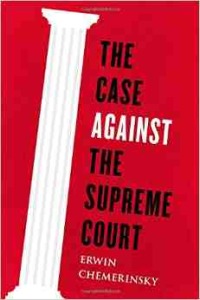
Published by Viking on September 25, 2014
Erwin Chemerinksy says that his goal in writing The Case Against the Supreme Court was to determine whether the Supreme Court has made society better or worse. I would argue that legislatures have the primary job of making society better or worse since "better" and "worse" usually involve policy judgments that elected officials should make. The Supreme Court's job is not to make policy but to enforce the values that underlie the Constitution by assuring that the other branches of government do not exceed their constitutional authority or violate rights that the Constitution protects. I understand Chemerinsky's point -- when the Court does those things, it makes society better; when it fails, it makes society worse -- but I'm not sure I agree with his larger point that the institution should be faulted because the Justices who serve on it have so often been gutless and short-sighted.
I can't fault Chemerinksy's observation that the Supreme Court has often failed in its critical tasks. The Court too often sides with the government in conflicts with individuals, even when the government abuses it power, and with corporations in conflicts with consumers. The Justices often give too little weight to the Constitution's core values and too much to popular political opinion. But a different outcome in a couple of close presidential elections (including the election that the Court shamefully decided in Bush v. Gore) would have resulted in majorities on the Court that would probably have produced fewer disappointing decisions. Chemerinsky recognizes that, of course, but I think his disappointment with the Court as an institution is really a disappointment with the majorities that have often controlled it.
To illustrate his argument, Chemerinsky claims to set aside ideology and to concentrate on decisions the Court rendered that are contrary to American values as understood by liberals and conservatives alike. He is only partially successful in that endeavor. Yes, nearly everyone agrees that Dred Scott (requiring the return of a slave who reached a "free" state) and Korematsu (upholding Japanese internment camps) and Plessy (upholding racial segregation) and Buck (permitting the involuntary sterilization of the "feeble minded") were not only incorrect but horrible decisions. There is less consensus about the Lochner era decisions (invalidating government regulation of wages and hours and child labor) but most people now agree that the power to regulate interstate commerce includes the power to police employment practices and workplace safety. Nearly half the book, however, is devoted to more recent cases that sharply divide the right and the left. I can't say that Chemerinsky is able to set ideology aside when he discusses the Roberts court, but that discussion takes up a good bit of the book.
Although I largely agree with Chemerinsky on questions of social policy, I have trouble with his reasoning. Chererinsky rarely asks whether the Court's decisions followed the law, but asks instead whether the Court made society better or worse by upholding or striking down particular laws. I found it easy to agree with many of his conclusions but not so easy to agree that it the Court's job to decide a case based on whether its decision will make society better or worse. The real question is whether a law or act is consistent with the Constitution and with the values the Framers embodied within it. Keeping guns out of schools is good social policy but using the Commerce Clause to regulate conduct that has nothing to do with interstate commerce is not.
It also strikes me that the Court has, in the recent past, made some important yet controversial decisions that Chemerinsky would probably agree make society better (such as protecting the right to confront witnesses and striking down mandatory sentencing laws that deprive defendants of jury trials). Chemerinsky ignores many of those cases, although he does acknowledge the decision to uphold Obamacare and to strike down laws that discriminate against same-sex couples -- cases that undermine his argument that "the Court" (rather than specific majorities) has failed the country as an institution.
Part 3 looks into the future and asks what we can do about the Supreme Court, a question that seems largely rhetorical. He comes down against the notion of doing away with the Supreme Court, a disastrous view that is advocated by some respected law professors and a whole lot of yahoos. Even a bad Supreme Court is better than no Supreme Court, given the frequency with which legislatures try to circumvent the Constitution. His primary arguments for reform (merit selection for Justices, stop pretending that ideology plays no role in the confirmation process, and term limits), if implemented, would provide no guarantee that the Court's decisions would be any better.
Despite my reservations about the conclusions it draws, I enjoyed reading The Case Against the Supreme Court. It is particularly useful as a cathartic howl of pain regarding court decisions that elevate corporate interests above human interests. The book is lively and free of legal jargon. Anyone with at least a moderate interest in politics, history, or law should find the book to be useful and engaging, even if (like me) they do not necessarily agree with its premise.
RECOMMENDED